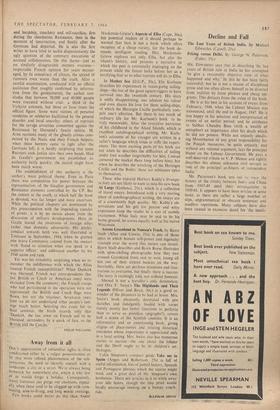Away from it all
ONE'S appreciation of unfamiliar sights is often conditioned either by a vulgar possessiveness or by that more refined, phenomenon of the sub- conscious, the need to 'identify oneself with a landscape, a city or a street. We're always being homesick for somewhere else, which is why few of us would forgo a holiday. Consequently, travel literature can ',Urge our emotions, especi- ally when these tend to be chugged up with com- muting, nine-to-us Mg, and long winter evenings.
Few books could better do this than Averil Mackenzie-Grieve's Aspects of Elba (Cape, 30s.), but potential readers of it should perhaps be warned that hers is not a book which offers escapism of a cheap variety, for the book de- mands intelligent reading. Mrs. Mackenzie- Grieve explores not only Elba, but also the island's history, and presents a narrative in which the past is continually impinging on the present while the future lurks before her as a terrifying fear as to what tourism will do to Elba.
In Mother Sea (0.U.P., 30s.), Elis Karlsson describes his experiences in ocean-going sailing- ships—the last of the great square-riggers to have survived into the twentieth century. His story is oddly disappointing; one admires his valour and even shares his love for these sailing-ships, of which the Herzogin Cecilie particularly com- pels one's affection. But there 'is too much of ordinary life for Mr. Karlsson's book to be truly memorable. After the evocative narration of his childhood in the Aland Islands, which is excellent autobiographical writing, Mr. Karls- son's accounts of his voyages are written in a sailor's language which tends to stifle the experi- ences. The most exciting parts of•his hook are not when he describes the difficulties of sailing under foul weather (regrettably for him, Conrad
cornered the market there long before him), but when he describes the wrecking of the Herzogin Cecilic and the Bodia: these are miniature epics in themselves. • • Those who enjoyed Herbert .Kubly's Stranger in/la!)' ate not likely to want to miss his new book
At Large (Gollancz, 21s.), which is a collection of travel essays. Introduced with a very moving piece of autobiographical writing, the essays are of a consistently high quality; Mr. Kubly's ob- servations and his gift for precise and witty expression keep the reader in a Sort of mobile
excitement. While Italy may be said to be his home ground, he scores. equally well at his native Wisconsin. , Across Greenland in Nansen's Track, by Bjorn Staib (Allen and Unwin, 25s), is one of those epics in which human will-power and ingenuity
triumph over the worst that nature can invent. Bjorn Staib.describes and Bjorn Reese illustrates with spine-chilling photographs how they two
crossed Greenland from east to west, losing all but one of their sixteen huskies on the way.
Inevitably, there are perilous situations and frus-
trationsqo overcome, hut finally there is success. The .story is excitingly told, not without humour. Abroad is not a traveller's only destination, and Otta F. Swire's The Highlands and Their
Legends (Oliver and Boyd, 30s.) is a good re- minder of the pleasures to be had at home. Mrs. Swire's book, pleasantls decorated with pen sketches and indulgently loaded with verses (surely poetry has better functions to perform than to serve as pointless epigraph's?), covers half a dozen of the Scbtlish counties. It is an• informative and an entertaining book, giving Origins of place-names and relating historical
anecdotes whose importance is appreciated only in a local ,setting. Mrs. Sw ire also has numerous, stories to narrate----the one about the lobster and the Devil ought to be in children's an- thologies.
Colin Simpson's _compact guide Take me to Spain (Angus and Robertson,. 25s) is full of useful information, bits of potted history, Spanish and Portuguese phrases which the tourist might need, and a great deal of Mr. Simpson's own bonhomie:There are articles in it to while away' your idle hours, though the tiny print would hardly encourage reading on a bumpy coach- ride.
ZULFIKAR GHOSE'






































 Previous page
Previous page